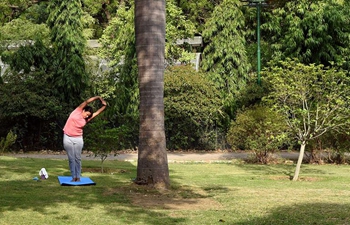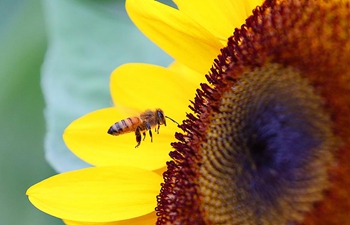By Olatunji Saliu and Yemi Fadare
ABUJA, June 21 (Xinhua) -- Thirty-one-year-old Binta Babangida counts her blessings daily by the number of young women she has empowered through her business in Minna, a city in central Nigeria.
Through the shea butter business which she learned and took over from her mother, Aisha Babangida, at least 60 women have benefited from the trade and earned a veritable means of livelihood.
"As a child, I inherited the shea butter processing from my mother. I followed her to the bush to pick shea nuts and became very interested in the shea butter processing," Babangida told Xinhua on Friday.
"As I speak to you now, my livelihood depends on the processing of shea butter and the sales I make from the processed shea butter products. I always tell my apprentices that they can secretly make millions from this business without people noticing them," she said.
Mainly used here as cooking oil, in candle-making, hairdressing or cosmetic products, waterproofing wax, and as an ingredient in medicinal ointments, shea butter is derived from shea nuts, for which Nigeria is known globally as its major producer.
Babangida joined in the shea butter processing when she was 8-year-old and expanded her production through attending numerous training programs organized within and outside Nigeria. She has traveled to many countries, exporting her shea butter products while making more contacts across the globe.
Having surpassed the height her mother had reached in the business before she took over, the lady, who only graduated from the university two years ago, now has an expansive shop in Minna, capital of Niger State, where she sells her processed shea butter products and trains mostly young ladies of her peer group.
"I think the shea butter business is an untapped gold mine in Nigeria. A lot of people, even the government, do not pay attention to the potential of exporting shea," Babangida said.
In Nigeria, the shea butter is a natural endowment waiting to be tapped. Unfortunately, the shea butter production is currently threatened by a lot of factors which include cutting down the economic tree for firewood by people in some rural areas who believe the tree is wild.
The most populous African country is home to a wide range of plant species, including the shea tree, for which there is an existing market.
According to local agricultural experts, the shea tree grows naturally in many parts of Nigeria.
Abiodun Bello, a local researcher, told Xinhua that the tree grows for a considerable time of 11 to 15 years to bear fruit, after which it can remain productive for up to 200 years and yielding about 15 kg of fruit per tree.
Bello said through specialized agriculture and agroforestry techniques, the cultivation of the shea plants could further provide a viable business that not only supports local manufacturers but also generates export income and employment in the country.
Niger State alone, where Babangida and others ply their trade, contributes over 57 percent of global shea butter needs, according to data by the Federal Ministry of Trade and Investment.
The Raw Material Research and Development Council in Nigeria said as of 2016, the documented annual production by the West African country is between 330,000 tonnes to 350,000 tonnes while the potential production is estimated at 800,000 tonnes.
However, out of the 800,000 tonnes of shea nuts produced in Nigeria, only 20,000 tonnes is processed into butter, while the rest is exported to neighboring West African countries.
Kodo, a community in Bosso local government area of Niger state, where their main activity is farming has shea trees in surplus. The women of the community are already used to shea butter processing, although they do so in very small quantities in their homes.
Chairperson of the local shea butter processors union in Kodo, Hauwa Aliyu, identified a lack of support from the government as the major challenge of the local shea butter producers.
However, shea butter exports has the potential to surpass oil in foreign exchange earning for Nigeria, if the right investments are made to grow, harness and process it to international standard, according to Segun Awolowo, the executive director of the Nigerian Export Promotion Council.
"Nigeria can earn about 10 billion U.S. dollars annually from the exportation of shea butter alone," Awolowo said.
On Thursday, the Nigeria Agribusiness Register, which creates a platform for agribusiness networking in the country, said Nigerian shea dealers will build processing factories estimated at about 30 million U.S. dollars.
The agency said it seeks to facilitate 3.4 billion U.S. dollars in new agribusiness investments by 2023 from domestic and foreign sources, through the provision of free and chargeable business development services to capital providers and project promoters.
The initiative is designed to be operated on a private-public partnership basis.
In a snapshot of the Nigeria shea industry in Abuja, Roland Oroh, the director of the agency, noted that Nigerians have commenced the production of local modern processing plants with about five to eight plants in the pipeline, estimated cumulatively at 30 million USD.
"These should materialize over the next two to three years," the official said, noting that shea is currently perceived as an important commodity that would bring about rapid development and financing under Nigeria's export facilitation initiative.
"The Nigerian shea sector is also currently attracting international shea actors," the official added.













